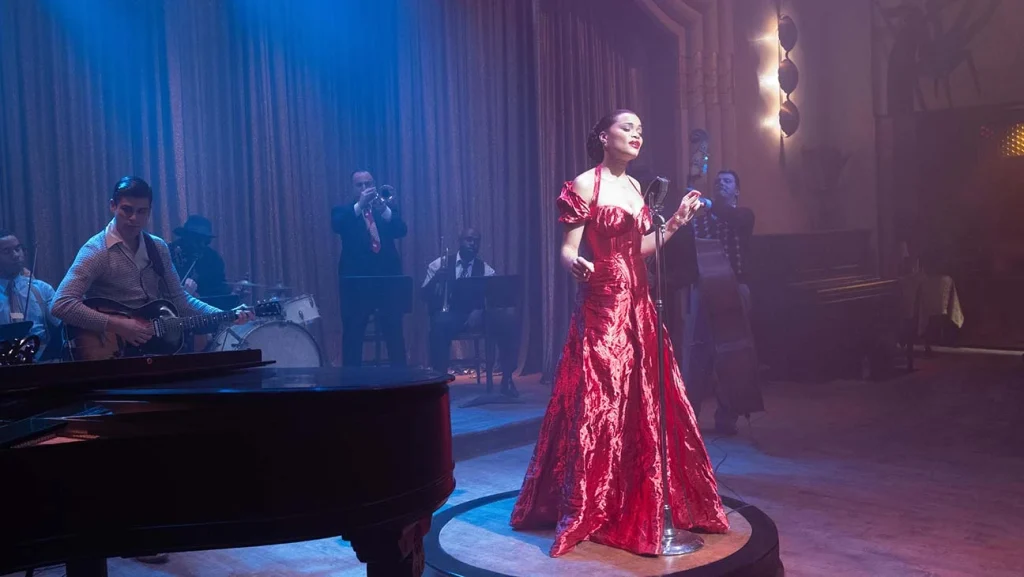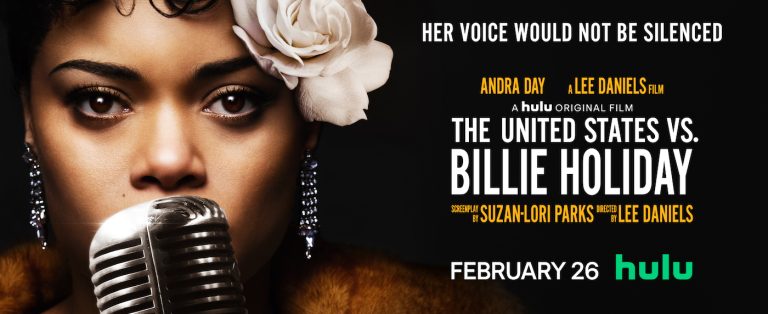Oscar Nominations:
Leading Actress (Andra Day)
Southern trees bear a strange fruit
Blood on the leaves and blood at the root
Black bodies swingin’ in the Southern breeze
Strange fruit hangin’ from the poplar trees.
That’s the first verse from the poem, and later a song, called “Strange Fruit” by Abel Meeropol. He wrote the poem after being ‘inspired’ by a photograph of a lynching.
As you can imagine, just from the images provoked, the song has a powerful impact. And, if we are to understand the movie, it had a huge effect on the psyche and life of Billie Holiday.
Born in Philadelphia, in 1915, – as Eleanora Fagan – her father abandoned the family shortly after she was born to pursue a career as a jazz musician. Her mother worked jobs on passenger railroads and Eleanora was raised by her aunt. She quit school at age 11, was nearly raped a few months later, and she spent time in a home under protective custody. Afterwards she found work running errands in a brothel and cleaning floors for better off neighbors. A few years later, at the ripe old age of 14, she joined her Mother in Harlem. It was there that she discovered jazz clubs and her singing career began.
Eleonora took the stage name of Billie Holiday, taking her first name from an actress she liked and a modified version of her Father’s last name, Halliday. She became a leading R&B and jazz singer, competing at times with Ella Fitzgerald. Her voice has a raspy, smoky quality that is, perhaps, best expressed when she sings the blues – America’s unique contribution to music history. Despite the quality of her singing, when she performed, especially in the South, she was not accorded the same privileges as her white band-mates – including things like riding the elevators.
For whatever reasons, and there are probably dozens, she also had an off and on again relationship with drugs. Lord knows we have plenty of musicians who fall into that trap (think Amy Winehouse, Freddie Mercury, or Elton John) and she also didn’t have enough belief in herself to maintain non-abusive relationships with men. Between all of that, she experienced an upward spiral and then a slow downward fall that ended with her death, from liver cirrhosis, at the age of 44.
The song “Strange Fruit” came to her in 1939 at the Greenwich Village club, Cafe Society. Holiday was drawn to it because it reminded her of how she lost her father early because, as a black, he was denied medical care for a lung disease. She clearly related to the strong images in the song and her performances resonated with the listeners. She was even mentioned in Time magazine because of the song.
“The United States vs Billie Holiday” is the name of a lawsuit filed against her in 1947 over possession of narcotics. She plead guilty and asked to be placed in a hospital to recover. Instead, she was sentenced to a prison in West Virginia and she lost her license to perform in any club serving alcohol. It is also the name of this movie which takes a great deal of license with all of these facts and combines them in ways that I’m not sure completely reflect reality. Nonetheless, this is an intriguing portrait of a complex woman.
The movie tries to make the case that the FBI targeted Holiday from the time that she started singing “Strange Fruit” until right up to the moment of her death. The story is based on the book “Chasing the Scream” by Johann Hari. The script expands on the book and presents its arguments in a half-compelling fashion. Certainly, given what we know of J. Edgar Hoover’s FBI, it is entirely feasible that the government did their utmost best to harass her based on her success as a “Negro” and the influence she had on her audiences with her powerful rendition of “Strange Fruit”.
I haven’t read the book, but I can report that the screenplay for this movie (by Suzan-Lori Parks, Pulitzer Prize winner) still seems very minimal. Perhaps because there is so much going on in this woman’s complex life, between her difficult past, her abusive relationships, her musical success, and her drug use – the script can’t seem to keep up. We are treated to a lot of material, but it is all very thinly addressed. It seems to me that it is a little too easy to pin her early death on government harassment, it could have easily been attributed to any number of her biographical threads. As A.O. Scott (New York Times) wrote “Like nearly everything else in this feverish, frustrating movie, the political themes are handled with maximal melodrama and minimal clarity.” Matt Zoller Seitz (RogerEbert.com) wrote: “The film is so poorly structured and in-depth edited that I often wasn’t sure what I was looking at, when it was taking place, or what the filmmakers wanted me to take away.”
The film rated just near the bottom of all 41 Oscar-nominated films this year by both critics (Metascore) and audiences (IMDB audience rating) alike. The audience rating might be understandable a bit: the film is only available on Hulu and only 12,000 ratings have been recorded. But 43 critics have, overall, panned this film.
Mostly, I tend to agree with these ratings, although I think they are a bit harsh. Still, I would encourage my readers to see this film if, for no other reason, than the performance of Andra Day as Billie Holiday. Although she is not known as an actress, she is an accomplished singer. And she brings that musical talent to this film in huge ways. She sings a dozen Billie Holiday songs and, if there is no other reason to see this movie, then see it for the way she renders the blues music. (The probable reason why it wasn’t nominated for the music is that the Academy does not have a category for Non-Original Song Performance – maybe it should). Day captures Holiday in all her musical glory.
And not just musically – Andra Day fully deserved the nomination for Best Actress. (Although I love Frances McDormand, I think Day bested her in this performance). Despite a confusing script, Day manages to bring all of Holiday’s contradictions together in one tightly coiled bundle of emotions. In ways I can’t imagine as a Black Woman, Day shows a full palette of Holiday’s feelings – the blues of her pain, the reds of her passions, and the yellows of her contradictory feelings towards those around her.
If you are appalled by nudity and sex, then you really have to avoid this film. But in one scene, Day captures all of the pain of her sexual abuse, her need for sexual release, and her surprise at being offered another option. Even buck-naked, she has the poise to pull that off. I have one more Best Actress film to see, but at the moment, Andra Day is my winner – as she was with a number of critics.
So this will be a hard movie for many people to watch because of its availability only on one streaming channel. But if you have an opportunity, watch it just to see a new, powerful actress in the making. Oh, and the music too. (4 Stars)
Available only on Hulu


